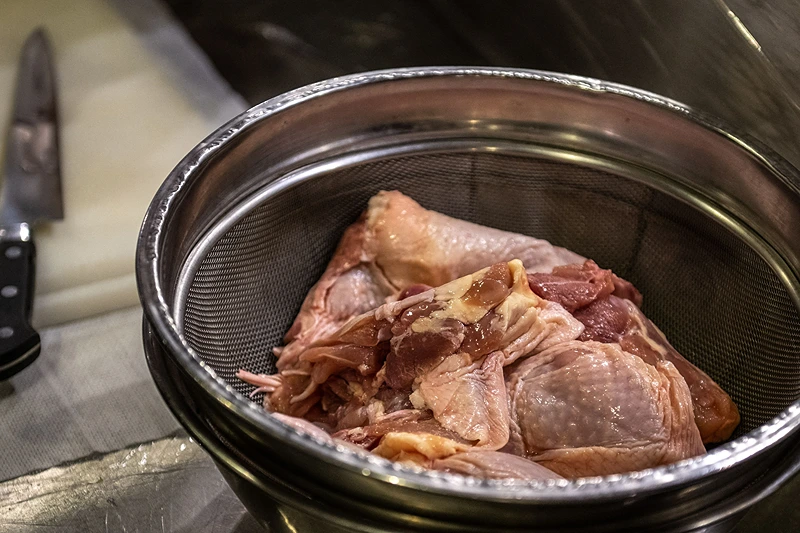
OAN Staff Brooke Mallory
10:37 AM – Tuesday, July 30, 2024
On Monday, the Food Safety and Inspection Service (FSIS) of the United States Department of Agriculture (USDA) released a detailed proposal and decision aimed at successfully lowering Salmonella contamination and illnesses linked to raw poultry products.
This marks the end of a three-year endeavor by FSIS to reassess their approach to managing Salmonella rates in poultry and safeguarding American consumers against foodborne illnesses associated with the consumption of poultry products.
The Centers for Disease Control and Prevention (CDC) estimates that each year in the United States, salmonella bacteria causes over a million infections in humans. Poultry is one of the main sources of foodborne Salmonella diseases, and food is the primary source of Salmonella infections.
According to FSIS estimates, there are approximately 43,000 foodborne Salmonella illnesses linked to turkeys and 125,000 illnesses related to chickens annually.
“Despite FSIS data indicating that Salmonella contamination in poultry products has been decreasing, there has not been an observed reduction in Salmonella illnesses,” according to the USDA.
“Far too many consumers become sick from poultry contaminated with Salmonella, and today’s announcement marks a historic step forward to combat this threat,” Agriculture Secretary Tom Vilsack said. “This proposed framework is a systematic approach to addressing Salmonella contamination at poultry slaughter and processing, which includes enforceable standards that will result in safer food for consumers and fewer illnesses.”
In order to stop raw chicken carcasses, chicken parts, ground chicken, and ground turkey products with high levels of Salmonella from being sold into the public domain, the proposal would set final product standards that would prohibit any type of Salmonella at or above 10 colony forming units (CFU) per gram/ml and any detectable level of at least one of the Salmonella serotypes of public health significance. Enteritidis and Typhimurium are the hypothesized Salmonella serotypes of public health relevance found in raw chicken carcasses, chicken parts, and comminuted chicken. Hadar, Typhimurium, and Muenchen are found in raw comminuted turkey. A microbiological monitoring program would also need to be developed by poultry operations in order to prevent pathogen contamination throughout the slaughter facility, according to the proposal.
“The proposed Salmonella framework is grounded in data and rigorous scientific evaluation, and it reflects feedback from extensive stakeholder engagement,” Dr. Emilio Esteban, the USDA Under Secretary for Food Safety, said. “We encourage all interested stakeholders to submit comments and relevant data on the proposal as we work to finalize data-driven, science-based regulatory policies to address Salmonella in poultry.”
In its own efforts to collect data and information for the proposed rule and determination within the framework, FSIS has been conducting various activities since 2021. These actions included organizing a public meeting and multiple roundtables, conducting an exploratory sampling program for chicken carcasses to generate microbial data, adding quantification to FSIS’s Salmonella testing program, and charging the National Committee on Microbiological Criteria for Food with providing guidance on the kind of microbiological criteria the agency might use to better prevent Salmonella infections associated with poultry products.
Building on FSIS’s ongoing efforts to safeguard American consumers, including the prevention of false and misleading label claims, is the proposed rule and findings for the Salmonella framework. FSIS also released a final determination earlier this year to designate Salmonella as an adulterant in raw breaded stuffed chicken products when the contamination level surpasses 1 CFU per gram of Salmonella. This year, FSIS unveiled a final regulation that will restrict the voluntary “Product of USA” claim to FSIS-regulated goods originating from domestically born, raised, killed, and processed animals.
After this proposal is published in the Federal Register, comments must be received within sixty days.
“Comments may be submitted online via the federal eRulemaking portal, available at www.regulations.gov; by mail sent to Docket Clerk, U.S. Department of Agriculture, Food Safety and Inspection Service, 1400 Independence Avenue SW, Mailstop 3758, Washington, D.C. 20250-3700, or by hand or courier delivery to 1400 Independence Avenue SW, Jamie L. Whitten Building, Room 350-E, Washington, D.C. 20250-3700. All items submitted by mail or electronic mail must include the agency name and docket number FSIS-2023-0028,” the USDA stated.
Stay informed! Receive breaking news blasts directly to your inbox for free. Subscribe here. https://www.oann.com/alerts

